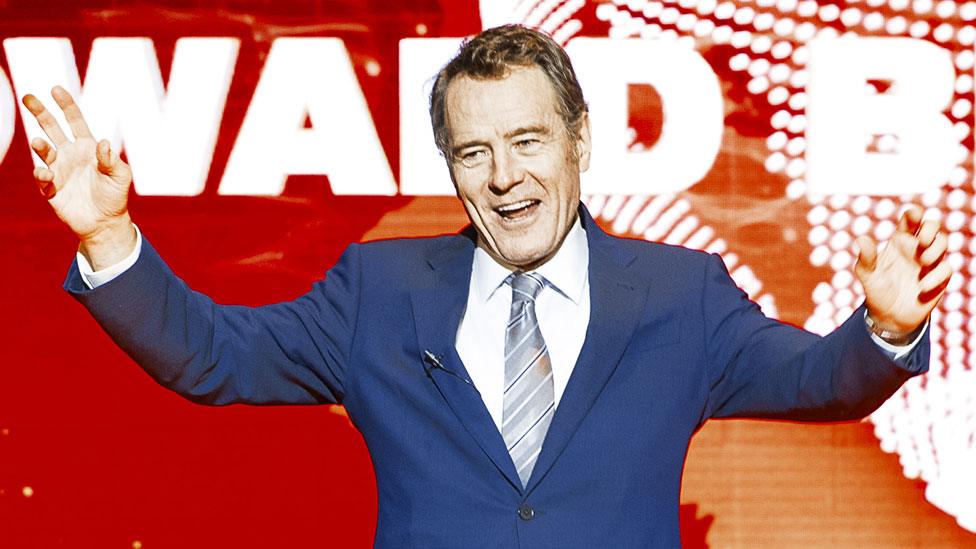The Morning Show: Will Gompertz reviews Aniston and Witherspoon's Apple TV drama ★★☆☆☆
- Published
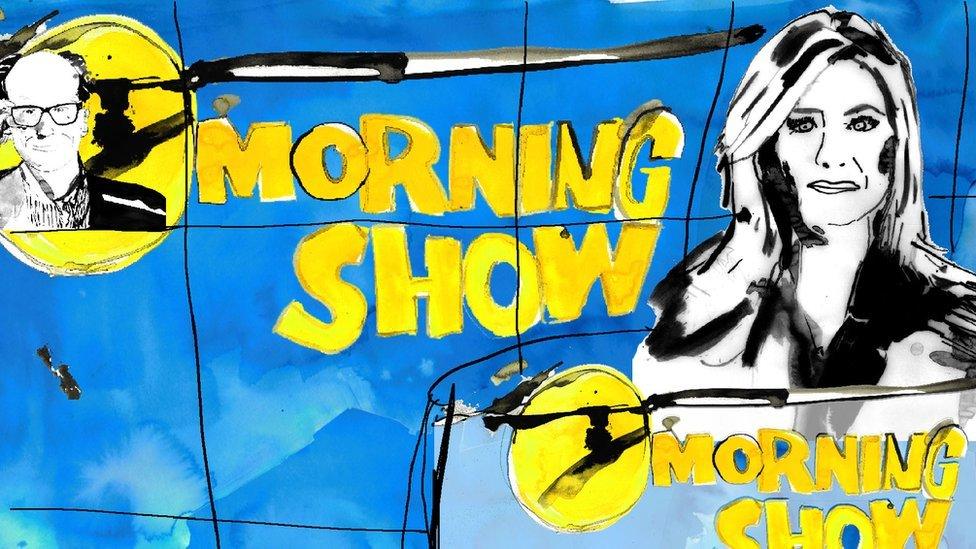
Apple has made some good products over the years, real game-changers like the original 1984 all-in-one Macintosh, as well as all those nifty "i" gadgets: the iMac, the iPod, the iPhone and so on.
Of course, there have been misses along the way.
Remember the Newton? The Pippin?
And what about the 2006 iPod hi-fi? It was the tech giant's attempt to muscle in on the lucrative speaker-doc market. But it was too late to the party, received lukewarm reviews, and was withdrawn a year later. The consumer expects Apple to be a leader not a follower.
Lesson learnt?
Possibly not.
This Friday (1 November) saw the launch of Apple TV+, the company's £4.99-a-month original content streaming and download service. This marks the Cupertino-based company's entry into an already crowded and highly competitive marketplace with established players such as the BBC's iPlayer, Netflix, Hulu and Amazon Prime. Disney is on its way too with a back-catalogue that puts Apple's handful of shows in the shade.
It means the modest amount of initial content Apple is offering will have to be very good indeed to lure punters away from the competition. Or, maybe, boast one of those innovative twists on which the organisation's reputation and fortune are built.
Well, there's not anything particularly fancy about the perfectly serviceable interface and user experience. And judging by the first three episodes of its starry blockbuster launch drama The Morning Show, it could find itself back in iPod hi-fi territory.
The opening episode is as bad as anything I've seen since we entered this golden age of telly, which, arguably, started in 1994 with Friends (still the most popular show on Netflix).
There is a connection…
Rachel (Jennifer Aniston) and her sister Jill (Reese Witherspoon - Season Six, Feb 2000) are back in Manhattan together. But they've changed their names to Alex and Bradley respectively and aren't sisters at all, but TV news journalists. Alex is the successful co-anchor of The Morning Show, while Bradley has flown in from West Virginia where she was plying her trade as a reporter with a nose for hard news and an appetite for a fight.
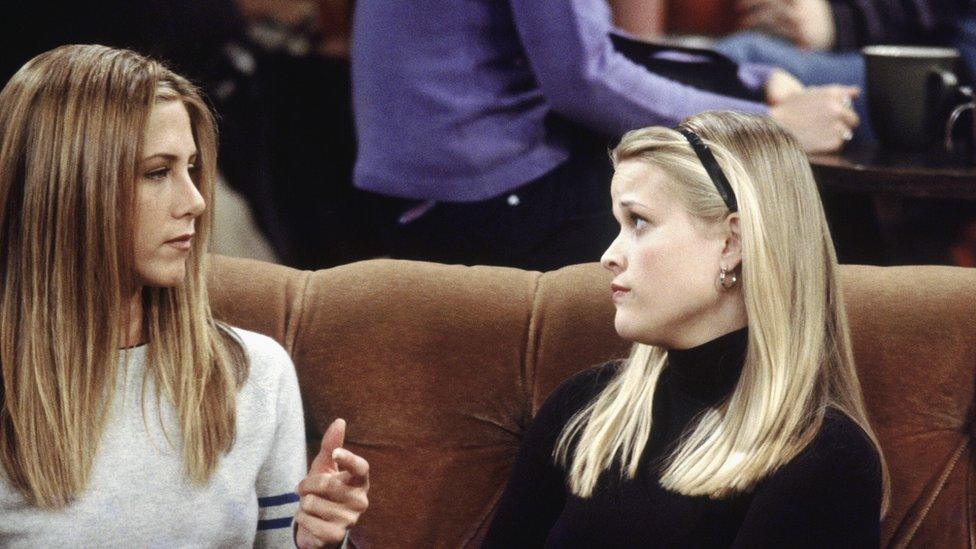
Back in 2000, Jennifer Aniston as Rachel was joined in this episode of the hit TV series Friends by Reese Witherspoon, who played her sister Jill


Nearly 20 years on, Reese Witherspoon (Bradley Jackson) and Jennifer Aniston (Alex Levy) star in and executive produce The Morning Show

The action (I use the term loosely) starts at around 03:00 when Chip Black (Mark Duplass), The Morning Show's executive producer, receives a call bearing bad news from his boss (there are a lot of calls throughout, all on iPhones funnily enough).
"We're destroyed," say Chip gloomily into the receiver.
He phones The Morning Show's co-anchor Mitch Kessler (Steve Carell).
"Someone better be dead, buddy," growls Mitch, which, to be fair, is exactly my reaction when the BBC Radio 4's Today Programme calls me at some unearthly hour.
And then Alex's alarm goes off and she gets up and goes to work in a bit of a daze. Only to be confronted by Chip standing awkwardly with his hands in his trouser pockets making them look like jodhpurs. He is a picture of anguish.
"Oh my god, who died?" asks Alex.
Chip gulps.
Nobody, it turns out.
Something much worse as far as Alex is concerned. Mitch, her co-host and "TV husband" on the morning news show for the past 15 years, turns out to be a workplace "sexual predator".
We don't know Mitch, we don't know the show (although it appears to be referencing NBC's Today Show, from which host Matt Lauer was fired in 2017 following allegations of sexual misconduct, which he denies), we don't know Alex, and what we've seen of Chip so far is enough to suggest we don't want to know him either.
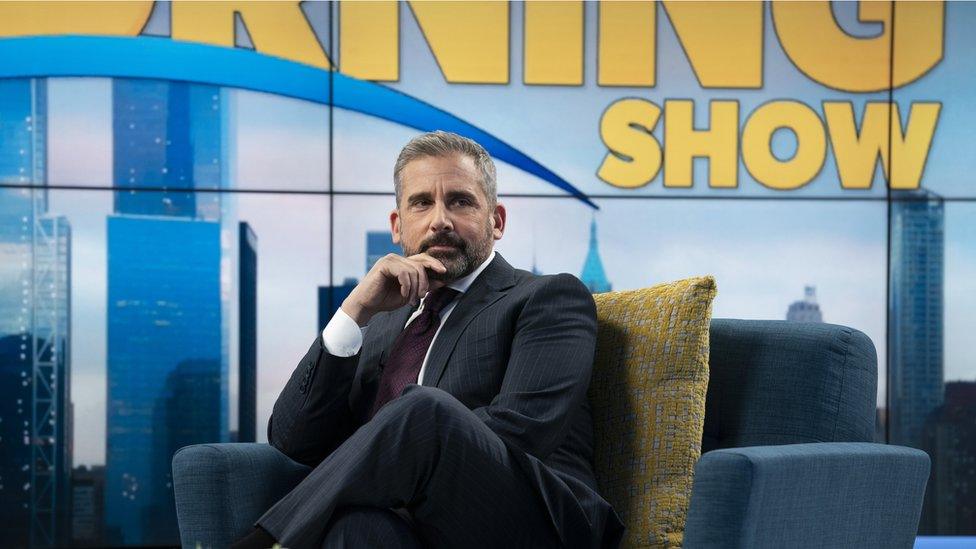
Steve Carell plays Mitch Kessler, who is fired as The Morning Show's co-host over allegations of sexual misconduct

This is a problem.
Because The Morning Show lurches straight into high-drama mode with Alex taking the lead through gritted teeth and fighting back tears because her beloved Mitch has been summarily fired. Which leaves you thinking... so what. It's all too soon.
We're not on board yet. We're not invested in the characters or the story. It's only a few minutes in and we don't care.
It's like having Christmas in July, we're not ready.
The upshot of which is that the terrible script, laboured directing, and wooden acting are cruelly exposed.
The dialogue is clunkier than a misfiring moped, written with an ear not of tin but of stone.
I don't know if you remember Victoria Wood's spoof soap opera Acorn Antiques, but if you do it is just like that but not as funny.
That is to say, it is amateurish, which is remarkable given the cost ($300m, or £232m, for 20 episodes according to Bloomberg, a figure contested by the drama's director Mimi Leder) and the star cast. None of that matters, though, if you haven't got the basics right, which in the world of TV means one thing above all else, and that is the writing.
A script riddled with cliches such as those pouring from Mitch's mouth as he sulks at home with his squad while watching Alex explain to America why he isn't beside her, won't do:
"Everything's changed and they forgot to send me the memo."
Or
"Since the dawn of time men have used their power to attract women."
Or
"I didn't hold a gun to anyone's head. It was consensual. Most of them came on to me."
Steve Carell is a decent actor, but even he cannot make these lines land. Nor can Aniston and Witherspoon when it's their turn to deliver speeches designed to establish their characters but are so inelegantly crowbarred into the boilerplate plot that they have the opposite effect.
The cliches don't stop with the script.
The characters are straight out of central casting, which is hopeless given the show's ambition to explore the 21st Century entertainment industry post #MeToo, #OscarsSoWhite and #TimesUp.
We have Cory Ellison (Billy Crudup) the know-it-all male boss who only cares about ratings and his career. We have Alex, seen as an ageing anchor whose vulnerability and newly found righteousness might just be the thing that brings the viewers back to a tired show. And we have the relationship between an older man and younger woman.
So far, so Network.
The difference being Network was made in 1976 when a TV newsroom drama felt fresh. Not so much 43 years later, when the subject is so common it has become a genre.
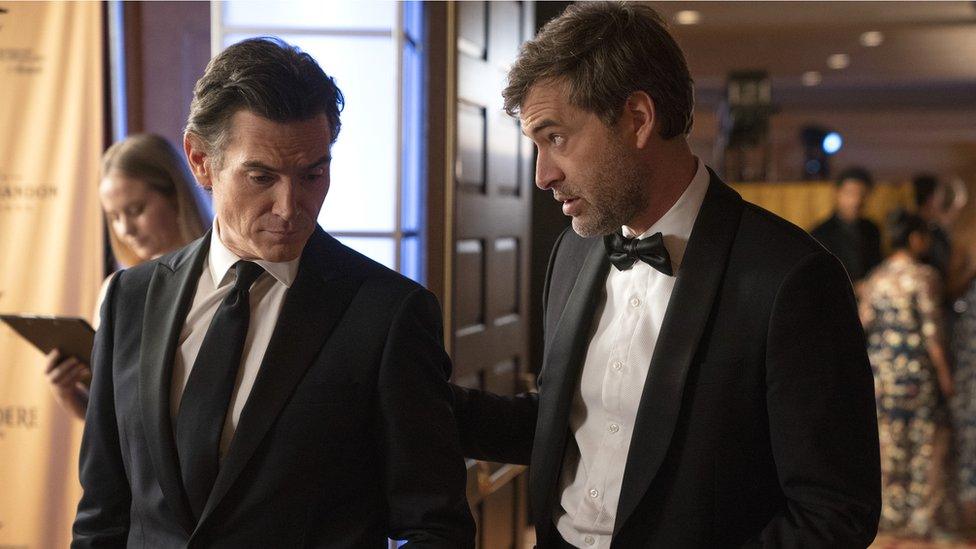
Billy Crudup plays Cory Ellison, the ratings-obsessed president of UBA's News Division, with Mark Duplass, who is Charles Black, The Morning Show's stressed executive producer

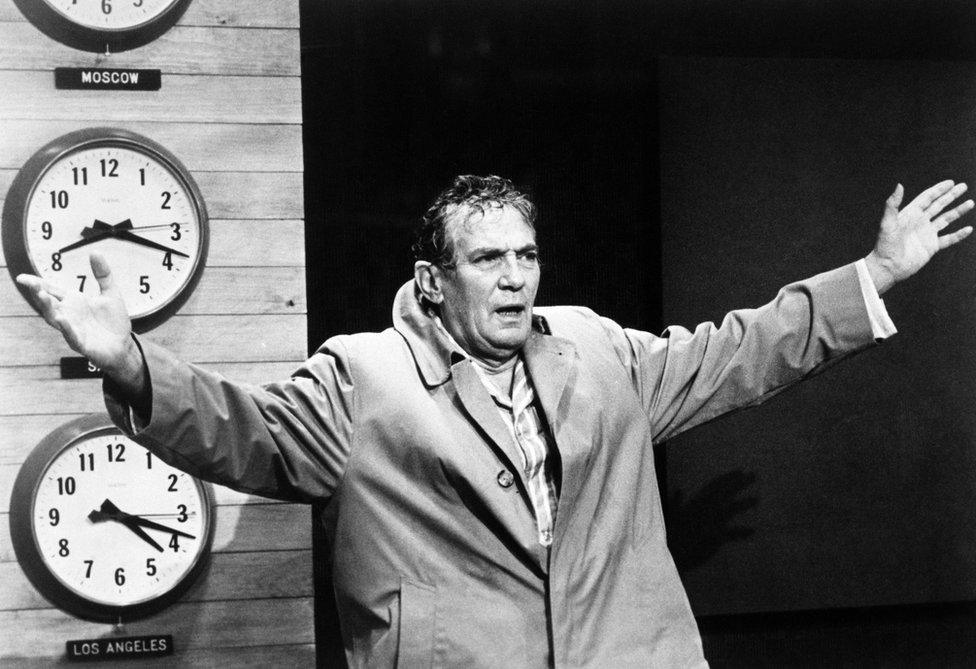
In the film Network, Peter Finch is news anchor Howard Beale, who gets poor ratings and then tells viewers he's as "mad as hell"

It's not all terrible.
The third episode is not nearly as bad. The contrived plot set-ups are in place, the dialogue is more focused, and the characters are beginning to show signs of life.
But problems remain.
This is supposed to be a contemporary piece about gender politics. And yet the two female lead characters are depicted as emotionally volatile women making decisions on impulse, while their male boss from whom they seek to wrest control is portrayed as intellectual, analytical and psychologically stable.
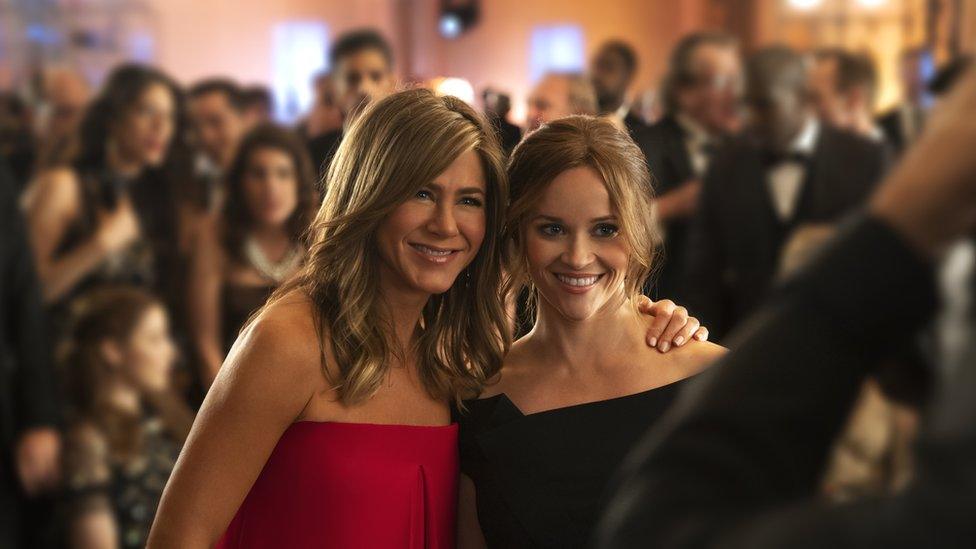
The show's muddled thinking is evident again when a character is introduced claiming Mitch sexually assaulted her. Surely this provides some real drama at last to lift us out of Alex's tedious contract negotiations? But no. We hardly see or hear a word from the alleged victim. Her story is deemed not important. Instead, it's all about Alex again and how she is or isn't going to handle the interview with Mitch's accuser.
The poetry of Robert Frost is evoked at one point, and there's a nod towards the famous queuing scene in Annie Hall, suggesting the show's creators know what good writing looks like. But they are woefully short of the mark in the first three episodes that are currently available to see.
Maybe the next seven eps are going to be a knock-out.
It is certainly moving in the right direction.
But all I can do at this juncture is paraphrase the old-time Hollywood mogul Sam Goldwyn and say: Apple TV+ has raised writing to a new low.
Recent reviews by Will Gompertz
Follow Will Gompertz on Twitter, external
- Published18 November 2017
